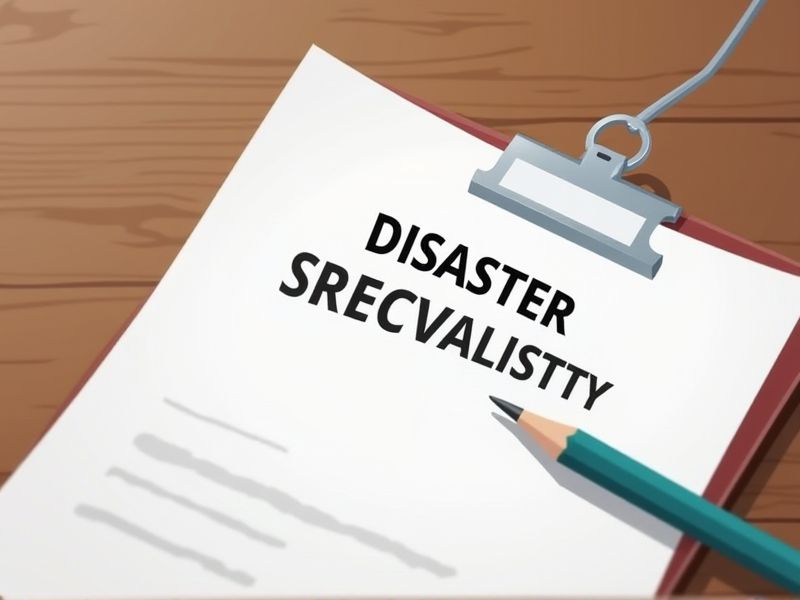
Disaster Recovery Specialists play a critical role in maintaining business continuity and ensuring data security during unforeseen events. Certifications provide them with standardized knowledge and skills essential for effectively managing disaster recovery processes. These credentials also enhance credibility and demonstrate a commitment to staying current with industry practices. Key certifications in this field can distinctly qualify you as a Disaster Recovery Specialist.
Certified Business Continuity Professional (CBCP)
A Certified Business Continuity Professional (CBCP) offers a structured approach to identifying, assessing, and managing potential disruptions, ensuring organizational resilience. By holding the CBCP certification, a Disaster Recovery Specialist can demonstrate competent knowledge in creating and implementing effective recovery strategies. The CBCP certification provides expertise in compliance with industry standards and regulations, relevant in legal and operational contexts. Achieving this qualification not only broadens technical skills but also enhances credibility and trust with stakeholders during recovery scenarios.
Associate Business Continuity Professional (ABCP)
An Associate Business Continuity Professional (ABCP) certification ensures that a Disaster Recovery Specialist has the foundational knowledge necessary to develop and implement effective business continuity plans. With the ABCP credential, specialists are better equipped to assess risks and identify critical functions that need immediate recovery during disruptions. The certification validates one's understanding of essential recovery strategies, which is critical for minimizing downtime and ensuring quick recovery after a disaster. In today's risk-prone business environment, having an ABCP-certified professional enhances an organization's resilience against unforeseen disruptions.
Certified Disaster Recovery Engineer (CDRE)
Organizations face increasing threats from cyber incidents, natural disasters, and technical failures, necessitating a Certified Disaster Recovery Engineer (CDRE) to design robust recovery solutions. CDREs possess comprehensive knowledge of risk assessment and have proven skills in developing, implementing, and testing disaster recovery plans. Their expertise ensures minimal downtime, safeguarding business operations and data integrity. CDRE certification demonstrates a professional's commitment to maintaining high standards in disaster recovery and continuity planning.
ISO 22301 Lead Implementer
A Disaster Recovery Specialist relies on ISO 22301 Lead Implementer expertise to establish robust business continuity management systems, ensuring organizational resilience during disruptions. The ISO 22301 framework provides structured procedures essential for systematically identifying potential threats and impacts, thereby enhancing preparedness. Implementing ISO 22301 leads to improved communication and processes across teams, reducing downtime and financial losses during emergencies. By leveraging the framework's guidelines, specialists can align disaster recovery plans with international best practices, which enhances stakeholder trust and regulatory compliance.
Certified Information Systems Security Professional (CISSP)
Having a Certified Information Systems Security Professional (CISSP) qualification equips a Disaster Recovery Specialist with a comprehensive understanding of information security protocols, enhancing their ability to plan effective recovery strategies. The knowledge base derived from CISSP ensures that the specialist is adept at identifying potential security vulnerabilities that could impact disaster recovery operations. This certification validates a professional's expertise in managing cybersecurity threats, crucial during a disaster recovery scenario where threats may escalate. CISSP holders possess critical skills in risk management and mitigation, essential for developing robust disaster recovery plans that ensure organizational resilience.
Certified Information Security Manager (CISM)
Organizations need a Disaster Recovery Specialist to ensure business continuity, and having a Certified Information Security Manager (CISM) provides a strategic advantage due to their expertise in managing IT risk and implementing security protocols. CISM certification indicates a professional's capability to design and oversee an infosec program aligned with organizational goals, which is crucial for effective disaster recovery planning. Their skills in governance and risk management enable the creation of comprehensive recovery strategies, reducing potential downtime after a crisis. With CISM's proficiency, organizations can maintain regulatory compliance and safeguard sensitive data during recovery operations.
CompTIA Security+
CompTIA Security+ certification equips professionals with fundamental security best practices essential for disaster recovery planning. Understanding network security through Security+ helps disaster recovery specialists identify potential vulnerabilities that could jeopardize recovery processes. The certification covers risk management principles, crucial for a specialist in planning and executing efficient disaster recovery strategies. Expertise gained through Security+ ensures that recovery environments can be secured against future threats, enhancing the overall resilience of disaster recovery management.
Certified in Risk and Information Systems Control (CRISC)
Certified in Risk and Information Systems Control (CRISC) equips Disaster Recovery Specialists with expertise in identifying and managing enterprise IT risks. This certification ensures they understand the alignment of IT infrastructure with risk management strategies. Employers benefit from CRISC-certified professionals as they can devise more comprehensive disaster recovery plans, reducing potential downtime. CRISC fosters a proactive approach to handling technology disruptions, enhancing organizational resilience.
Certified Data Centre Professional (CDCP)
Possessing a Certified Data Centre Professional (CDCP) credential provides a solid foundation in data center operations, which is crucial for understanding the physical and virtual systems involved in disaster recovery. The training emphasizes core skills in power, cooling, and security management, supporting the efficient recovery of systems during a disaster. CDCP-certified professionals are better equipped to develop and implement strategies that minimize downtime, crucial for protecting business continuity. Having a deeper understanding of data center operations directly enhances a Disaster Recovery Specialist's ability to manage risk and improve recovery times.
VMware Certified Professional - Data Center Virtualization (VCP-DCV)
A Disaster Recovery Specialist deals with scenarios where system downtime poses significant risks, and VCP-DCV certification ensures expertise in managing virtualized data centers, which are central to modern recovery strategies. In environments where rapid data recovery and minimal downtime are essential, understanding VMware's virtualization technology facilitates quicker system restorations. The certification provides knowledge of how to efficiently allocate resources within virtual frameworks, which is critical during disaster recovery operations. It also instills skills in deploying and managing high availability and fault-tolerant infrastructures, which are necessary for continuous operation during unexpected disruptions.
Summary
When you obtain certifications as a Disaster Recovery Specialist, your expertise and credibility in the field significantly increase. This enhanced qualification often leads to improved job prospects and potentially higher salary offers. Organizations generally trust certified professionals more, resulting in greater responsibilities and opportunities to lead. Certification also ensures you remain updated with best practices, enhancing your capacity to manage and mitigate disasters effectively.
